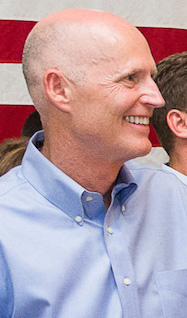New Opportunities, Challenges For Scott In Second Term
January 1, 2015
As Gov. Rick Scott prepares to take the oath of office for a second time Tuesday, he does so as a different figure than the political newcomer who struggled with his inaugural speech four years ago.
 Then, Scott and a Republican Party establishment that had opposed him during a GOP primary were still making their peace. The former health-care executive’s business experienced didn’t seem to have equipped him for the chaos of the legislative process. And Scott had squeaked into the governor’s mansion by one of the narrowest margins in Florida history.
Then, Scott and a Republican Party establishment that had opposed him during a GOP primary were still making their peace. The former health-care executive’s business experienced didn’t seem to have equipped him for the chaos of the legislative process. And Scott had squeaked into the governor’s mansion by one of the narrowest margins in Florida history.
This year, Scott is celebrating a re-election that few thought likely even a year ago. The party seems relatively united behind him, at least for now. And Scott has grown more comfortable in the job of governor.
But he also faces a changing dynamic, with the knowledge that at some point term limits and the inevitable political impulse to look forward will begin to take their toll on his ability to influence the debate. A presidential election looms with the possibility of two candidates from Florida in the Republican primary, and talk of Scott’s successor will grow after the 2016 elections — giving rise to the dreaded “lame duck” status.
“Midway into a second term is probably when we’re going to see it,” said Susan MacManus, a political science professor at the University of South Florida.
Perhaps with that in mind, many of the campaign promises Scott made in 2014 were less ambitious than his “7-7-7″ pledge in 2010 to bring 700,000 jobs to Florida in seven years. His “Florida 2020 Plan” focused largely on budget initiatives, many with a short-term focus. For example, Scott promised to boost per-student funding for public education to a record level in the spending year that begins July 1, and to slash $1 billion in taxes over two years.
Scott also said he would keep down college tuition — something he can largely do with a veto pen and his influence over members of the Florida Board of Governors, which oversees the state universities.
“You can look at those proposals,” Scott told reporters recently. “That’s what we’ll be working on.”
Scott has turned over his administration a bit. Adam Hollingsworth is out as chief of staff after two-and-a-half years of mixed reviews. Melissa Sellers, who ran Scott’s communications shop for a little more than a year before taking over his campaign in early 2014, has replaced Hollingsworth. How that change might reshape Scott’s administration remains to be seen.
For their part, Republican lawmakers who enjoy sizable majorities in the House and Senate are saying the right things about Scott’s chances over the next four years. Returning Rep. Scott Plakon, who lost his seat in 2012 but won another in 2014, admitted that there was some hesitancy between Scott and lawmakers early in the first term.
“But from everything I can tell, my two years serving with him and the last two years, there’s been a great relationship,” said Plakon, R-Longwood.
And Senate President Andy Gardiner, R-Orlando, brushed away the idea that Scott’s influence could quickly start to wane.
“Any time you have a veto pen, you don’t have lame-duck status, in my opinion, especially when you can line-item veto (budget items),” Gardiner said. “Certainly, there will be speculation of who’s after (Scott) — there’s speculation of who’s after me. That’s just part of the process.”
There are still challenges for Scott.
Democrats are likely to keep clamoring for an expansion of the state’s Medicaid program, though Scott seems to have lost interest in that since saying two years ago that he supported it. And the Democratic Party has disputed Scott’s statement that he’s already met the 700,000 jobs promise from his first bid for election, noting that Scott promised those positions on top of normal economic growth — something that could require him to create another 1 million to match that mark.
“Rick Scott is starting his second term the same as his first,” wrote Joshua Karp, a Florida Democratic Party spokesman, in a recent email to reporters. “With lies that don’t help the hundreds of thousands of Floridians who can’t find a job because of Tallahassee Republicans who put the special interests first, and middle class families last.”
And even before Scott’s influence begins to wane, clashes between the governor and the Republican Legislature are likely. Lawmakers, for example, have been noncommittal about how much of the state’s surplus they will devote to Scott’s priorities when they sit down to write the budget for the coming year.
“I’m very comfortable with the governor, and I think he has a healthy respect for the legislative process,” Gardiner said. “We’ll send him some things that he’s going to veto, and that’s just part of it. And he may ask us to do some things that the Senate, as a whole, just decides we can’t do.”



Comments